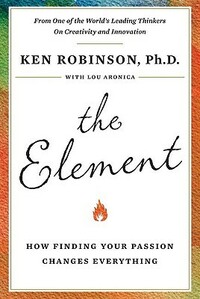Take a photo of a barcode or cover
Hands down, one of the most inspirational and motivational audiobooks I have ever read.
Sir Ken Robinson has an incredible outlook on how every single individual is creative, intelligent and uniquely talented. Fostering the bridge of natural talent and passion (that he dubs The Element) in each unique individual is how he believes that we will all reach our greatest potential and happiness, while contributing our best to both our local communities and the world. And frankly, I am absolutely with him on this. He tells the amazing stories of so many inspiring people, while weaving a narrative of necessary systemic changes that need to occur. Given that this book is a dozen years old, there are a few cringe-worthy phrases that distract from his overall inclusive manifesto. But, otherwise, it is even more relevant today than it was when it was published. As we all watch old systems crack and crumble, The Element certainly has many points of interest that should be considered as we endeavour to build a new world.
Audiobook is wonderfully read by the author.
Sir Ken Robinson has an incredible outlook on how every single individual is creative, intelligent and uniquely talented. Fostering the bridge of natural talent and passion (that he dubs The Element) in each unique individual is how he believes that we will all reach our greatest potential and happiness, while contributing our best to both our local communities and the world. And frankly, I am absolutely with him on this. He tells the amazing stories of so many inspiring people, while weaving a narrative of necessary systemic changes that need to occur. Given that this book is a dozen years old, there are a few cringe-worthy phrases that distract from his overall inclusive manifesto. But, otherwise, it is even more relevant today than it was when it was published. As we all watch old systems crack and crumble, The Element certainly has many points of interest that should be considered as we endeavour to build a new world.
Audiobook is wonderfully read by the author.
3.5 stars. A decent self-help book. The element is the things that we love to do and the things that we're good at coming together. Nothing revolutionary or groundbreaking. You can also call it your passion, calling, or whatever you do when you're in Flow.
The Element is recreational time not leisure time. One is fulfilling one is entertaining. Paychecks shouldn't validate talent.
The author got polio at a young age and that closed a lot of immediate doors for him such as soccer but then later on it opened many more doors in his life that probably wouldn't have opened had he not contracted polio. It's neat when these things happen. Now maybe you guys will quit crying about Covid-19.
Notes:
The only way to prepare for the future is to make the most of yourself.
We have more senses besides the five traditional ones such as:
- sense of balance
- sense of temperature
- sense of pain
- kinesthetic sense (which gives us an awareness of our limbs)
- sense of intuition (Some doctors don't like to recognize the)
The diversity of intelligences is one of the fundamental underpinnings of the Element, if you don't embrace the fact that you think about the world in a wide variety of ways you severely limit your chances of finding the person who are meant to be.
Creativity can be taught and learned like traditional intelligence.
People's intelligences are as diverse as a fingerprint.
The author likes the Herman brain dominant instrument test is better than the Myers Briggs one.
Almost as good as the element is finding your tribe. A good tribe should inspire validate and provide synergy.
Doing something for your own good is rarely for your own good if it causes you to be less then you really are.
Languages are the bearers of the culture genes.
There are four principles that characterize lucky people:
1) they tend to maximize chance opportunities
2) they are effective at listening and following their intuition
3) they expect to be lucky
4) they have an attitude that turns bad luck into good luck.
I believe my recent host Joe, is lucky. Or rather, he creates his own luck, like Harvey Dent.
Mentors appear in people's lives at opportune times.
I love his last bit on it's never too late.
There should be a difference in our chronological age and our real age.
People don't age. They decay and rot because of their bad choices.
I need to go to the website realage.com
The college degree was once a passport to a good job now it is just a visa because of the inflation of degrees and everyone has one.
He got on his little political soapbox at the end which was stupid and unnecessary. He couldn't have come up with a better name than "the other climate crisis" that we're going through?
The Element is recreational time not leisure time. One is fulfilling one is entertaining. Paychecks shouldn't validate talent.
The author got polio at a young age and that closed a lot of immediate doors for him such as soccer but then later on it opened many more doors in his life that probably wouldn't have opened had he not contracted polio. It's neat when these things happen. Now maybe you guys will quit crying about Covid-19.
Notes:
The only way to prepare for the future is to make the most of yourself.
We have more senses besides the five traditional ones such as:
- sense of balance
- sense of temperature
- sense of pain
- kinesthetic sense (which gives us an awareness of our limbs)
- sense of intuition (Some doctors don't like to recognize the)
The diversity of intelligences is one of the fundamental underpinnings of the Element, if you don't embrace the fact that you think about the world in a wide variety of ways you severely limit your chances of finding the person who are meant to be.
Creativity can be taught and learned like traditional intelligence.
People's intelligences are as diverse as a fingerprint.
The author likes the Herman brain dominant instrument test is better than the Myers Briggs one.
Almost as good as the element is finding your tribe. A good tribe should inspire validate and provide synergy.
Doing something for your own good is rarely for your own good if it causes you to be less then you really are.
Languages are the bearers of the culture genes.
There are four principles that characterize lucky people:
1) they tend to maximize chance opportunities
2) they are effective at listening and following their intuition
3) they expect to be lucky
4) they have an attitude that turns bad luck into good luck.
I believe my recent host Joe, is lucky. Or rather, he creates his own luck, like Harvey Dent.
Mentors appear in people's lives at opportune times.
I love his last bit on it's never too late.
There should be a difference in our chronological age and our real age.
People don't age. They decay and rot because of their bad choices.
I need to go to the website realage.com
The college degree was once a passport to a good job now it is just a visa because of the inflation of degrees and everyone has one.
He got on his little political soapbox at the end which was stupid and unnecessary. He couldn't have come up with a better name than "the other climate crisis" that we're going through?
It is a good book to read when you're doubting your place in life. It has good analogies and advice. I read it for class when I was regretting my major decision. At times it was really repetitive and made me lose interest in it.
informative
inspiring
slow-paced
I really respect the work Robinson is doing to raise the awareness of how broken our educational system is, and I love his TED talks. This book, however, felt schizophrenic; one part educational reform treatise, one part superficial self help, one part definition of his concept of The Element. I was hoping for less motivational message ("You can do it!") and more concrete methods for guiding yourself through your own search for your Element.
Excelent. The author motivates to search the element, combining criativity, making a reflection of each one's life.
Maybe I much more near of finding the element.
Maybe I much more near of finding the element.
Picked this up because of his TED Talk about creativity and education. First 80-100 pages or so were quite good (re: the antiquated heirarchy of disciplines in education (based on educating an Industrial Revolution-era workforce rather than a 21st century one), the undervaluing of creativity and different types of intelligence, etc.). But then it just drug on and on, and the writing started to feel uninspired and formulaic (point #6; anecdote sort of supporting point #6; now we see that point #6 is true). And then I just resented him by the end for not ending the book 150 pages sooner. Oh well.
The information in this book was interesting in many ways. The issue I have with it is that there is not really any kind of instruction for finding your element. More of a series of stories of how others did, which mostly involved not buying into the school system. So, not much in the way of instruction. But very informative.
In today's economy, we are constantly telling ourselves as well as our children and younger generations that when thinking of what to do with their futures, practicality is probably the best way to go. We consider the financial numbers, oftentimes convincing ourselves that it's better to play it safe and go with the path of stability. But Robinson turns that idea on its head - what is it doing to individuals, to our society, when we essentially push creativity and these other forces of passion aside that we can see time and again if we look to the great names and ages of history, if we are building a world where people's careers are merely jobs and not something they actually enjoy.
His solution isn't easy and it won't just happen over night, but I believe that he's thinking in the right direction: we must each find and embrace our Element, that thing he describes as "the meeting point between natural aptitude and personal passion."
Though I wouldn't go as far as to call this book narrative nonfiction, it is certainly filled with stories of real people to help illustrate his points. Some you may have heard of (like Paul McCartney) and others, not so much but that doesn't make their incredible contributions to the world any less extraordinary. While he does speak a lot about education and what educational reforms in recent (and not so recent) years have done to how we value creativity, do not feel like this book has nothing to offer you if you aren't a teacher or don't work in a school of some sort. This book has something for everyone. Are you passionate about math or global warming or cartoons? Then chase it. Do you have a good business sense but don't want to give up your love of music or dancing? There's a way to embrace all these parts of yourself and they can help you become the best version of yourself.
I first heard of Sir Ken Robinson when I was in undergrad working towards my teaching certificate, and after watching a video of the TED speech he gave in 2005, his thoughts blew my classmates and me away. Links to this soon popped up on our Twitter feeds and Facebook accounts, and people who have nothing to do with schools agreed whole heartedly with his concepts as well. So if there's something in your life that you LOVE but may be afraid to go after or try, I say give a listen here or read what Robinson has to say. Embrace your Element when you're lucky enough to discover it, and may it open up whole new worlds for you to explore.
His solution isn't easy and it won't just happen over night, but I believe that he's thinking in the right direction: we must each find and embrace our Element, that thing he describes as "the meeting point between natural aptitude and personal passion."
Though I wouldn't go as far as to call this book narrative nonfiction, it is certainly filled with stories of real people to help illustrate his points. Some you may have heard of (like Paul McCartney) and others, not so much but that doesn't make their incredible contributions to the world any less extraordinary. While he does speak a lot about education and what educational reforms in recent (and not so recent) years have done to how we value creativity, do not feel like this book has nothing to offer you if you aren't a teacher or don't work in a school of some sort. This book has something for everyone. Are you passionate about math or global warming or cartoons? Then chase it. Do you have a good business sense but don't want to give up your love of music or dancing? There's a way to embrace all these parts of yourself and they can help you become the best version of yourself.
I first heard of Sir Ken Robinson when I was in undergrad working towards my teaching certificate, and after watching a video of the TED speech he gave in 2005, his thoughts blew my classmates and me away. Links to this soon popped up on our Twitter feeds and Facebook accounts, and people who have nothing to do with schools agreed whole heartedly with his concepts as well. So if there's something in your life that you LOVE but may be afraid to go after or try, I say give a listen here or read what Robinson has to say. Embrace your Element when you're lucky enough to discover it, and may it open up whole new worlds for you to explore.




